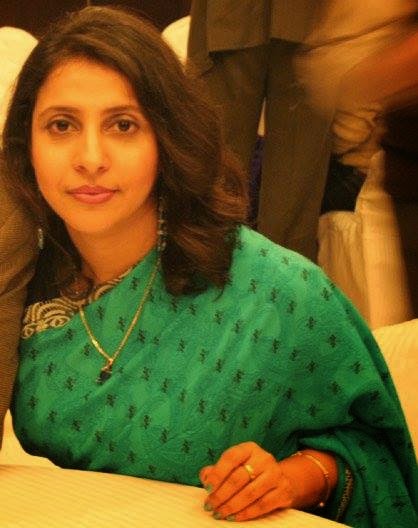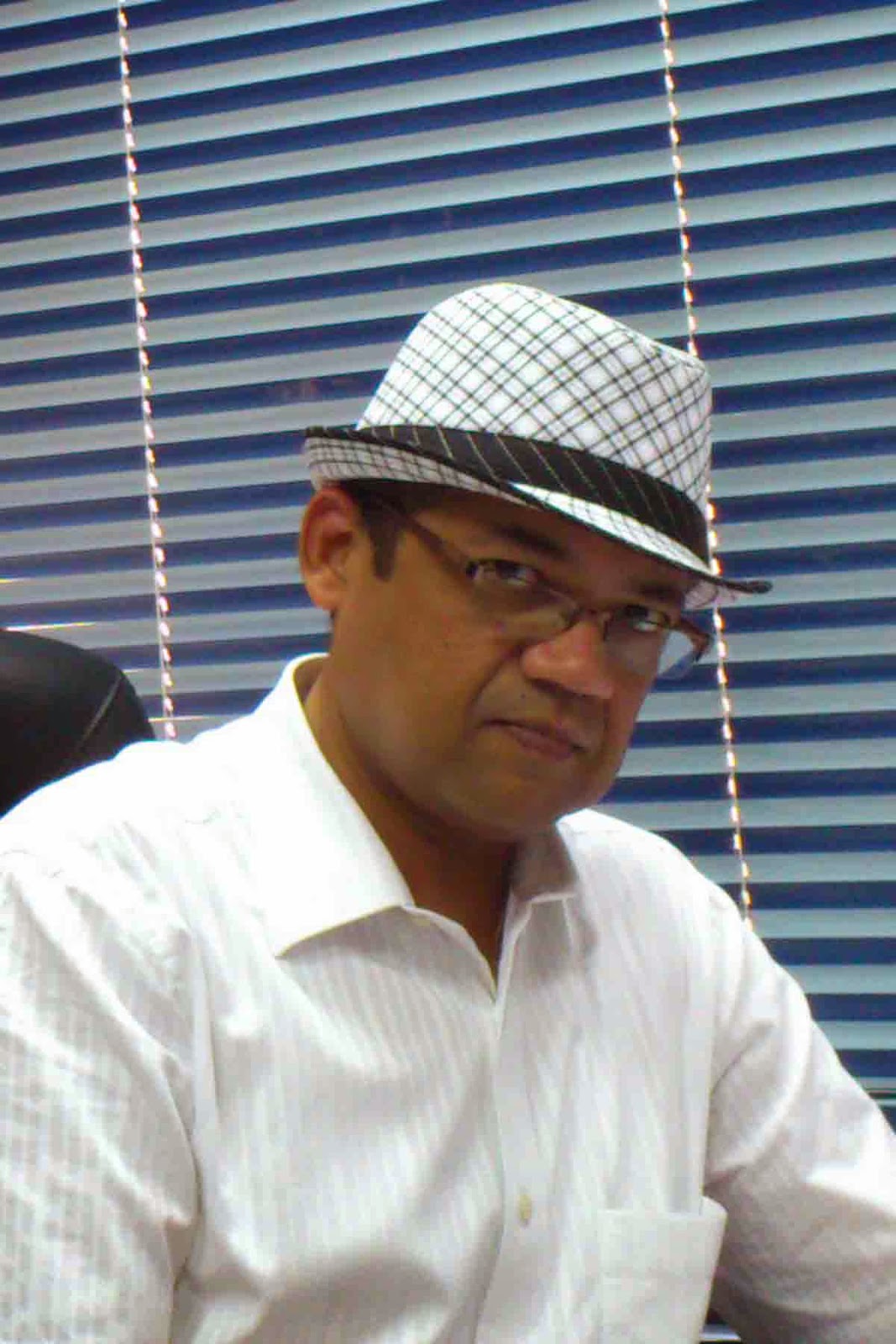 |
| artist: sachin venkatesh |
“Did you all understand what I just said?” He questioned as he turned from his calculations on the whiteboard, a marker in his hand, which he waved in the air for added emphasis.
Sunlight filtered in through the windows and the dappled shadows it cast through the leaves of the trees outside, played on the desks like butterflies flitting about on a hot summer’s day. The girls in the front row of the class nodded earnestly. He looked down from the long low wooden platform which ran the length of the front of the room at the 25 young girls of 10th Grade before him. Many years of teaching experience gave him the insight to know that those in the front rows always understood. It was the ones at the back that he had to spend more time with. He hooked his thumbs into his suspenders as he strolled down the aisle between the wooden desks. At least 95% of them looked as if they had grasped the model. (Mr. Raman always thought in mathematical concepts). Good, he thought to himself with pride, he should be able to maintain his 90% results average again this year. Then his eyes fell on the girl in the last row and the smile was wiped off his face as fast as an ice cream melts in a hot pan.
Tara, he grimaced inwardly to himself. Why did he have to have one of those trouble makers in his class every year? As bad as some of them had been, she had to be the worst of the lot in all of the thirty years that he had been at Rani Laxmibai Girls’ Academy. Never paying attention and always disturbing the class as well.
Mr. Raman was an institution in his own right: his suspenders, white pants and red socks were something of RLGA folklore. The girls joked with fondness about his dress sense and his manner of speaking years after they passed out. He was aware of it and he glorified in his eccentricities, believing they all formed part of who he was; his personality. What they didn’t joke about, was his approach to mathematics. They knew he was the best and even if they disliked him, they were glad to have him teach them. Raman was aware of that and took great satisfaction in boasting about his record results in math year after year. There was no way he was going to let Tara and her group of friends spoil his reputation.
“Yes girls, did you understand what I just taught you about the Ogive Graph?”
Most of them barely looked at him, except for Tara that is. She sat and stared at him, purposefully blank, not saying a word.
He was exasperated by their attitude and struggled hard not to show it. Snapping his suspenders in his frustration, he asked, “What about you Tara?”
She yawned gracefully, looked at her painted nails and then up at him, her face cupped in her right hand which she supported on the table in front of her. She opened her eyes wide; her voice was mock innocent as she asked, “Why would someone want to draw Ogive Graphs?”
On the face of it Raman knew it was a valid question; there was a part of him that acknowledged that he should have told them that at the very beginning, but he pushed that thought aside in irritation. That girl was being arrogant, how dare she question him, with all his years of teaching experience and his exemplary track record? To make matters worse, he heard the rest of the class tittering behind him. He hated being laughed at. It was the final straw, all the indignation of having to suffer six months of Tara’s impudence came bubbling up to the surface.
“Maybe you should go to the Principal’s Office to find that out,” he thundered.
Tara was still doing her innocent act and playing to her audience. “You mean she can give me an answer?”
The girls roared with laughter.
Mr. Raman was beside himself with rage. “Out, I say out,” he fairly sputtered. “She will give you an answer to very much more. I will not allow you into my class again till I get a written apology.”
“You asked me a question and I answered it, what do I need to apologise for Sir?” She challenged.
His voice was steely, “To the Principal’s Office please.”
Raman took deep breaths to calm himself as she collected her stuff and sauntered out. Darn that girl, why did she always try to show him up? It wasn’t just that she herself was such a rotten egg, unfortunately she was able to sway most of the class to copy her example too.
***
Raman was still seething over the incident as he made his way home that evening. He re-enacted the scene in his mind again and again as he was having his bath and changing his clothes. Freshly bathed with his white veshti and cotton vest on, he paced up and down the tiny kitchen, running his hands through his hair in agitation. His wife Sarla looked at him and tilted her nose in distaste and resignation. She knew she would have to wash out all the hair oil stains from his shirt tomorrow and that was no pretty task. She sighed, the more upset he was, the more stains she had to wash out.
Trying to distract him, she beckoned, “Come, let’s sit down and eat,” as she spooned out some fiery hot Kathrikkai Puli (Brinjal gravy) in a bowl and set it before him.
He was shaking his head in disbelief. “Can you imagine she questioned the way I was teaching Ogive Graphs? Me…me…thirty years I have taught; 90% pass rate I tell you, 90% pass rate and she can’t even get a frequency table straight and she dares to question me.”
She picked up his plate and put two big spoons of rice in it.
“I sent her to the Principal’s Office and Madam called me up in front of her and asked me what was the problem? Can she not understand how insolent that girl was acting? I am an old teacher of the school; a respected teacher and I am being asked these types of questions in front of a student.”
She filled a steel tumbler with water and set it before him, Then after wiping her hands dry in her sari pallu, sat down to eat as well. The bright green topped melamine table had seen better days. It was chipped at the edges and stained yellow with occasional turmeric spots. The metal folding chair was uncomfortable but she was used to it.
“The whole class was laughing at me because of her; tomorrow the school will know the Principal took her side against me.” His voice droned on relentlessly. “What will I say?” he asked rhetorically. “ I know my work 100 percent, no…no, 101 percent.” He banged the table for emphasis.
Sarla was used to these outbursts, they happened every year. Privately she thought he got too excited about his own importance. However she kept her thoughts to herself and nodded her head dutifully in between mouthfuls of rice, vegetable and dal; making little balls with the tips of her fingers and putting them delicately in her mouth. She knew she wasn’t really meant to answer; and was just there as a sounding board for his ire. Didn’t know what all the frequency table and graph talk meant anyway and it bored her to death. She chewed on the egg plant thoughtfully, maybe a bit more mustard would have been better. Now where was the pachadi? She looked around; must have forgotten to take it out of the fridge. She pushed her chair back to go and get it and he carried on talking to her empty chair: his food slopping down his hands even as he talked and gesticulated as he shoved it hurriedly into his mouth.
“If I don’t get 90%, my bonus goes down as well.”
Her hand stopped mid air as she was about to pull open the fridge door.
“What do you mean by that?” she questioned quietly.
He was too distracted to give a straight answer. Anyway for him it was not the money, never had been. In his eyes his excellent track record meant that he was better than the rest of the teachers. He took great pride in his achievements and never let any of them forget it. How could he face them if he didn’t get his 90% pass rate this year?
Raman stopped mid sentence, lost for a moment, his train of thought broken. “What?”
“What do you mean it will effect your bonus?” she asked again.
“Oh that, our bonus depends on the pass rate we achieve. If the students don’t do that well, then I don’t do well either.”
Her face looked strained, “I didn’t know that.”
“You didn’t need to,” was the simple answer.
As soon as they finished dinner and he settled down in front of the TV, she hurriedly washed up the dishes and went into the bedroom. Glancing furtively over her shoulder she took out a long flat box from the back of the cupboard. Glad of his preoccupation with the TV, she took the box and sat on the bed and opened it. She laid out the contents lovingly in front of her, on the bright red silken handkerchief that she had spread there. A feather, a small candle on a mirrored candle stand, a skein of white silken thread, two shiny flat brown stones, a pin cushion and a lump of play dough.
A deep anger simmered inside her, she had put up with a lot, and there was no way she was going to put up with losing out on his bonus. Her daughter was in America; her University fees had to be paid. He deserved it, they deserved it and no silly girl was going to do them out of it.
The rage was building inside her as she lit the candle on the mirror and put it on the bedside table. She put the feather and stones beside it and then picked up the play dough and fashioned it into the shape of a female figure. Then she tied the silken thread around its neck and set it down. Her eyes glinted in frenetic ferocity as she picked up the pin cushion and began shoving pins into the female figure malevolently. Her mouth twisted into a caricature of a smile.
“Tara! Tara! Tara!” She whispered each time she stuck a pin in, her voice tinged with a hint of hysteria.
She looked down at the small shape in her hands and smiled.
‘Did he even realize how much of that 90% he owed to her?”










